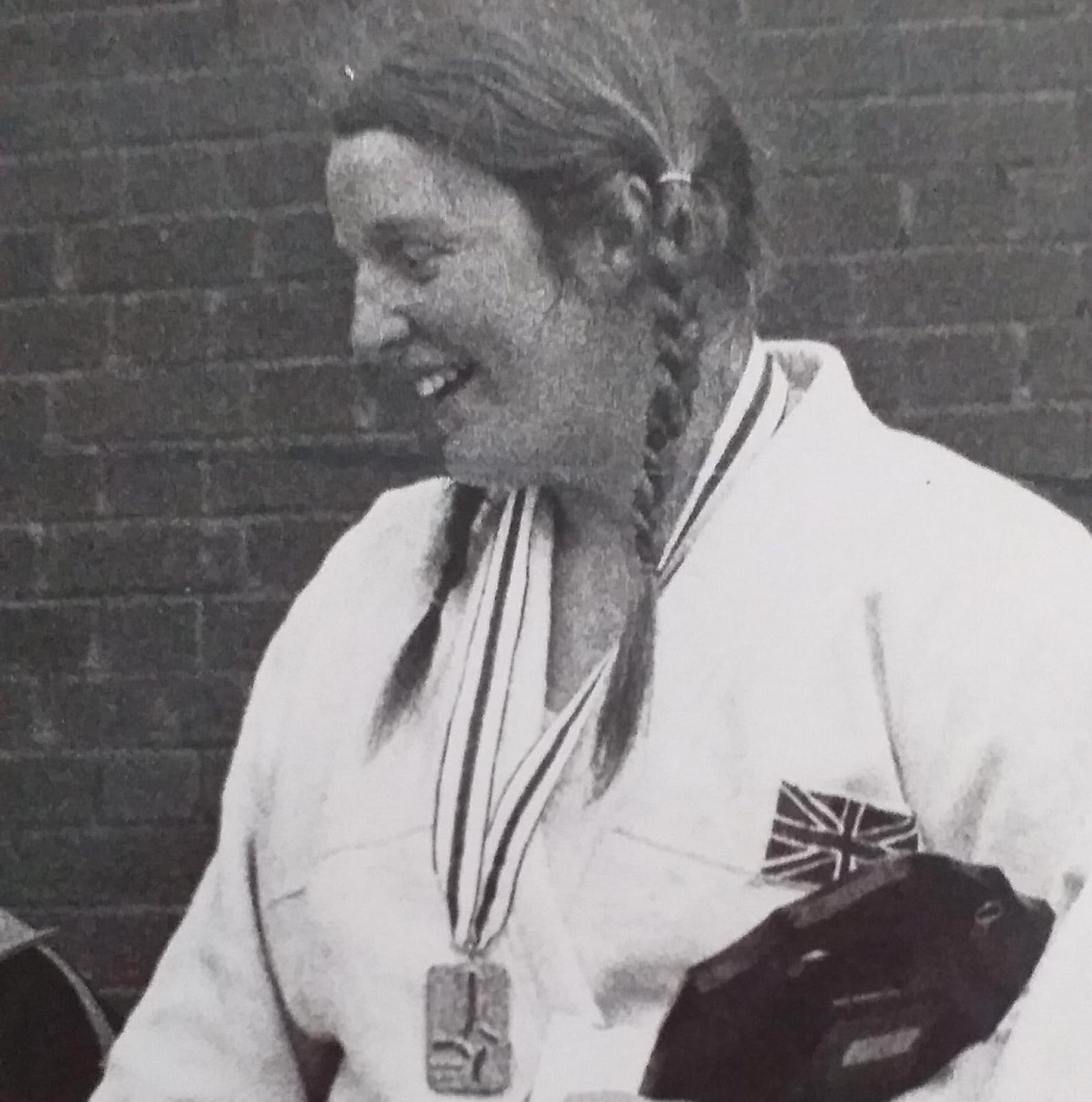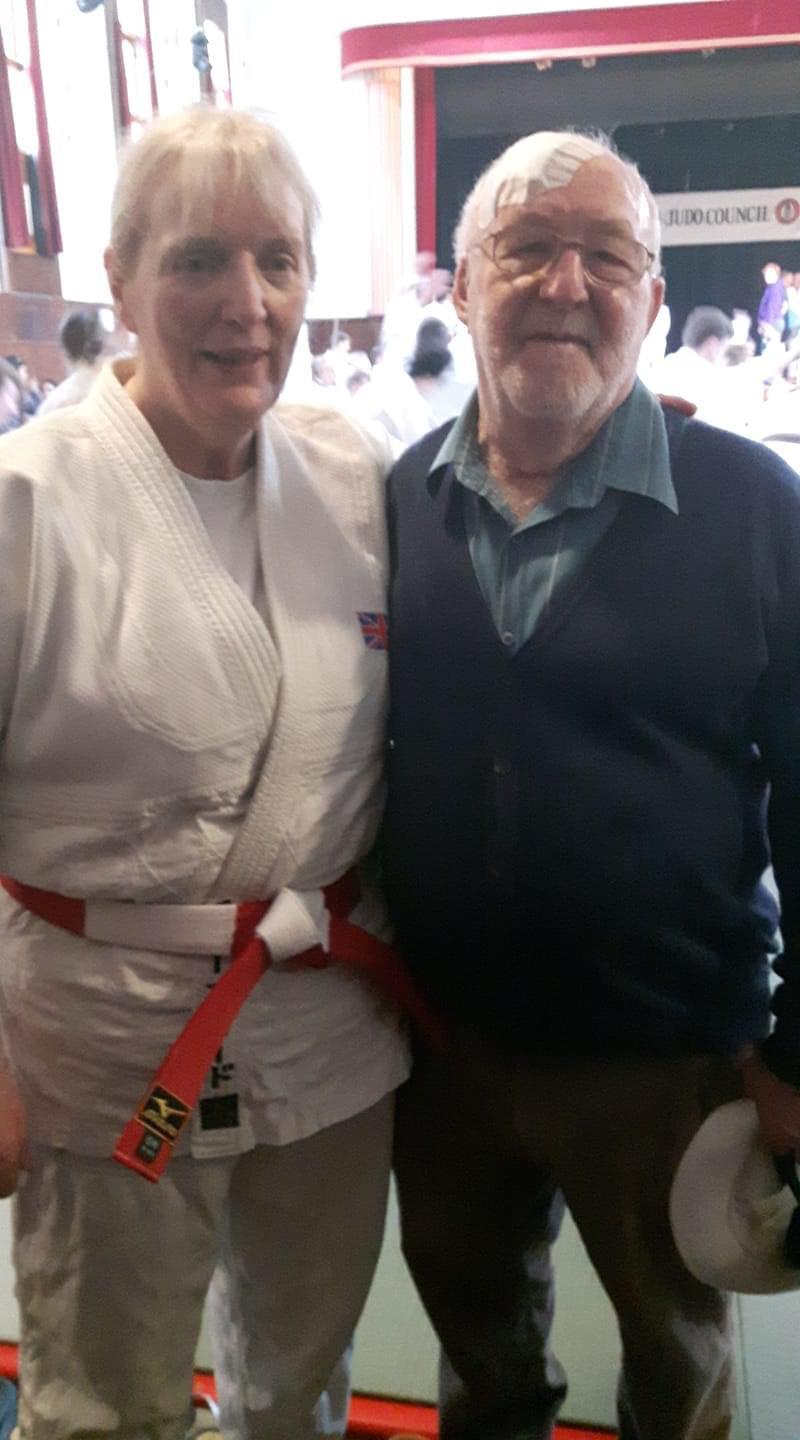First Women’s World Championships #4 – Catching Up with Heather Ford
At the tail end of 1980, in New York City, Madison Square Garden Indoor Arena, on November 29-30 a momentous event in the world of Judo took place: the first Women’s World Judo Championships.
There were seven fighters in the women’s Great Britain squad who competed in that inaugural event, and in the week leading up to the 40th Anniversary, British Judo will be posting an article written by Loretta Cusack-Doyle catching up with each member of the team, on the theme of “Where are they now?” interwoven with memories of the event from the ladies themselves from Loretta’s recent fun-filled chats with them.
Heather Ford +72kg – How did she do in competition?
Fighting as she did in the heaviest category +72kg, Heather Ford never had it easy in her international competitive career. To characterise Heather in relation to her international competitors, she was a big and strong judoka in comparison with her home GB and many European competitors – but she was not the biggest in global terms. She was lean, muscular, and fit. Going into competition, she always ran the risk of being matched against judokas who were taller and could be as much as 20 or 30kgs heavier than her. For this weight category, Heather had well above-average levels of skill and techniques. Unlike some other “heavyweights”, she could not rely on just picking up the opposition, and dumping them on their back. You could see her determination when on the mat; she used her eyes and brains and waited or created the right moment to pounce. She was fast and could transition quickly between techniques within her wide armoury of throws. Aged 27, she was the oldest in the team and had the longest track record of competitive success.

Photo: Heather Ford v Margo Castro USA showing the height and weight difference
By way of comparison, another much fancied competitor that day in the same weight category was the enormous Margarita de Cal of Italy who weighed in at a staggering 119.2kg.
Judo Magazine’s report on this competition described Heather’s draw as “terrible”. In the first round she drew Margaret Castro, described as, “… the (redacted) American who is well over six feet tall and weighs around 90 Kilos, and was one of the favourites for the title, especially amongst the American contingent…”
Heather was not daunted by her competition … or at least, she did not show it. Judo Magazine commented that, “…Heather Ford now produced the best performance I have ever seen from her against Castro whom she handled brilliantly and all but won…” In the corner, Roy Inman was shouting encouragement, urging Heather to try for a hip throw on her towering opponent. Unfortunately, though, Castro scored a Koka on Heather from Osoto-gake. It was not a clear score and indeed Heather got a hand down and for a while, the score went unnoticed and Heather believed that the decision would go her way. Unfortunately, the Koka won it for Castro.

Photo: Heather gracious in defeat against Margo Castro
Castro moved forward to the next round but lost her match that might have taken her into Bronze contention and so Heather did not get the opportunity to get into the repechage. Thus, it was the end of Heather’s competition on the mat on this occasion.
For me, Heather had a huge personality and with her natural leadership skills she was readily accepted by the other members of the GB team as the “Mother” of the team at age 27. She was just massively fun to be with. Her fighting on the mat might have been over that day, but that did not stop her going round everyone in the team, giving them encouragement, laughing, and joking and exuding masses of positivity, charm, and personality. For Heather, the competition continued until the last player had finished. She was a natural team player and leader.
What does Heather remember about the first women’s World Championships and its impact on her life and women’s Judo?
It was interesting to listen to Heather’s response to this question about the impact on her of the first women’s World Championship. “Do you know, Loretta”, she replied, “to me, at the time, it was just another judo tournament. I was there with the team and we were there to win medals. It was only years later that I realised the importance of that event and how ground-breaking it had been in taking women’s judo forward.”
It was a routine competition for Heather because at the age of 27 she was a very experienced international. Although she wasn’t formally part of the coaching team, she was 10 years older than me and 5-6 years older than the majority of the team, and she gave us the benefit of that experienced with her calm and grounded demeanour.

Photo: British Champion +72 Kg and Open three times 1979/1980
Heather remembers her Mother getting her started in judo in 1964 at the age of 11 and it was something she knew little or nothing about. Her club was the Harmondsworth Judo Club in West London and Dave Farr was her coach. Heather remembers that when she started competing she always seemed to be the youngest: indeed she remembers that when she took part in the first women’s team trials, she was just old enough to do so by a mere two weeks.
Her first medal at an international event was achieved in November 1972 when she won a Bronze at the British Open in Bracknell +68kg aged 17. Her inclusion in the 1980 GB team for this event was a forgone conclusion: within the previous 12 months she had won a Bronze at the European Open, a Gold in Austria, she was British Champion for her weight category for the past two years in a row. In 1980, she was British Champion in the Open category too, having achieved a Silver in the Open in 1979. In the previous five years she had also won Gold and Silver in the Dutch Open, plus three Bronzes in other competitions.

Photo: Heather and husband of 32 years Dave Farr – Personal Coach throughout her Judo career
She retired from the GB team in 1984. After retiring from the GB team, she became an assistant to Roy Inman, coaching the team and during that period she had the pleasure of taking the team to Japan.
In March 1988, she married her Coach David Farr at Harmondsworth Baptist Church where pupils of the Harmondsworth Judo Club formed a guard of honour wearing their judo suits. Of the marriage, she quotes her husband Dave as saying “it is the only thing, he has ever persuaded her to do that she did not want to do anyway.” I think this says something about her quiet, single minded determination to follow a path chosen by her, whatever that might be.
Between 1980 and her retirement, she accumulated a further 13 medals at major international competitions, comprising two Golds, two Silver and nine Bronze medals: a career total of 26 medals.
Heather keeps in touch with many of her former team members and opponents. She remarked that although they were competitors, there were friendships which she retains to this day. In many instances it was not uncommon in those days for the opposing teams to give board and lodgings in their own homes to the travelling GB team, and vice versa.
Heather admired and was good friends with Rusty Kanokogi, the pioneering advocate for women’s judo and the first World Championship: a powerful and intelligent woman blended with always being approachable and always willing to offer help and guidance.

Photo: One of many judo reunions with some of the original women’s GB squad from left to right: Christine Gallie 7th Dan double European Champion: Lynn Tilley one of the first ever European championships and five times World Master Champion: Margaret Burgess British Champion & European Bronze medallist. Heather can be found bottom right.
Heather wrote to her in September 2001 to make sure she was OK after seeing the Twin Towers disaster on TV, and she remembers that she got a lovely letter back and Rusty enclosed a Twin-Towers t-shirt. Being in contact with Rusty again and reading some of the comments and opinions expressed by Rusty in the letter made Heather more aware than ever of how things have changed and improved for women’s judo in the intervening years. Rusty achieved Olympic recognition for women’s judo at Barcelona 1992, and since then there have been six more Olympics with women competing. Had it not been for the COVID-19 crisis, we would have enjoyed and be celebrating the successes of the 8th women’s judo Olympics at the home of judo in Japan. Hopefully, we still have that to look forward to in 2021.
Heather Ford, now Heather Farr – where is she now?
Heather was never in a financial position to train full-time in judo. The funding was not available. And she probably did not want to anyway because she enjoyed her job as a Secretary involved with schools and administration in Education. She trained in the evenings, weekends, and early mornings. She fondly remembers that within the squad, she built up a great friendship with Avril Malley and whenever Avril came over from Northern Ireland to London for GB team get-togethers, she would stay over with Heather and these were fun times when training together.
When she retired from competitive judo, her love of the sport had her coaching with her husband Dave in the evenings at Harmondsworth Judo Club. Later they moved to Cornwall after Dave became very poorly: he worked with tropical fish and, following a lionfish sting, he had to stop working. With this move, Heather was able to continue in her school secretarial role in St Ives. She is still regularly active in the world of judo and is a member and teacher at the St Ives Judo Club. Although she was never a woman to make a drama out of a crisis, when moving to St Ives, she became interested in amateur dramatics, with some interesting roles – she loves comedy – Edith from “ Allo, Allo” and Gladys from “Hi-de-Hi!”.

Photo: Heather with Avril Malley, her best friend within the GB team
Heather continues to watch the progress of the modern day international elite athletes in the GB squad, both those based in Walsall and the excellent athletes we also have around the country in the four nations who successfully work outside of the centralised system.
In Heather’s opinion, there is no doubt that women’s judo is different than it was 40 years ago, but she is not into any sort of 20/20 rose-tinted nostalgic hindsight. She believes that the modern-day GB team will have all sorts of pressures that just were not part of the 1980s scene. Yes, they get more support in terms of medical, coaching full-time, modern facilities, career counselling and funding, but she feels that the pressure that is likely to come with that is something she would not welcome were she to be part of that scene nowadays. She also thought the modern focus on individual rather than team performance is regrettable because she welcomed the ability to share pressure and enjoy support from team colleagues which made judo not only more enjoyable, but more effective.
She wishes the GB Squad well in Tokyo when and if it happens and will be watching every moment she can.
The post First Women’s World Championships #4 – Catching Up with Heather Ford appeared first on British Judo.

